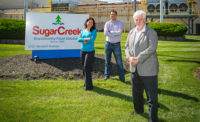Finding Its Niche
By Deborah SilveR,
Contributing Editor
Contributing Editor
Photos courtesy of Jemm Wholesale Meat Co.
Specialty lamb and veal products — natural, pre-cooked, private-label and more — are paving the way to success for Mountain States Rosen.
Mountain States Rosen
Bronx, N.Y. and Greeley, Colo.
Company: Mountain States Rosen
Locations: Bronx, N.Y. and Greeley, Colo.
2006 sales (projected): $150 million
Employees: App. 250
Facilities: Two plants, one in the Bronx and one in Greeley. The Bronx plant processes all of the veal and some of the lamb products. The Greeley plant processes only lamb.
Volume: App. 12,000 lambs and 950 calves per week
Products: Precooked, raw, case-ready, tray-pack, enhanced, hormone- and antibiotic -free, offered under the Cedar Springs brand and private-label retail brands.
Mountain States Rosen (MSR) has always been about innovation. The company was one of the first out of the box with microwaveable precooked lamb and veal products. Its EZ Cut line of pre-cut portions in case-ready bags proved a boon to both consumers and retailers. And, with its purchase of Premier Packing, the company became a major supplier of high-end, specialty veal products to foodservice and retail.
“Our goal has always been to be a fully integrated company that’s able to service both national chains and smaller operations by creating niche markets with our products,” says MSR vice president David Gage.
Now MSR, which has headquarters in Bronx, N.Y., and Greeley, Colo., is moving into a new arena: the booming field of natural meat products. “Our idea has always been to find areas to move our lamb into where others would have difficulty going,” says Gage. “We’re a farm-to-table company, so we have our animals from birth. That led us to ask ourselves, ‘Since we’re already able to track the complete cycle, wouldn’t it make sense for us to have a natural product?’”
Brand stand
The company developed its hormone- and antibiotic-free product line, Shepard’s Pride, three years ago, starting with 300 lambs per week. It now processes up to 2,000 lambs weekly and is expected to double that number by year end — all source-verified and USDA-certified.
MSR also sells its hormone- and antibiotic-free products to several large national supermarket chains, as well as to regional retailers in Colorado and Wyoming, which market them under their private labels. “Private label has exploded in the last six months,” says Joe DiBenedetto, MSR vice president of merchandising. “We’ve had numerous inquiries from major players who want to switch to a natural program and want to put our products under their own brand. Retailers now prefer to market their natural products — beef, pork, etc. — under their name. It gives them the added value of brand marketing.”
MSR already created its own brand, Cedar Springs, which consists of microwaveable precooked lamb and veal products, as well as further-processed and case-ready items. Cedar Springs grew out of an MSR-commissioned study that showed 25 percent of respondents would be more likely to purchase lamb if it had a recognizable brand name. Cedar Springs microwaveable dishes include lamb meatballs, barbecued ribs and cooked leg of lamb.
Further-processed items, which were introduced about a year ago under the Cedar Springs name, include veal patties, lamb and veal dinner sausages, and breakfast sausage links. The study also had indicated that consumers were looking for lamb products in categories that were not available. “Sausage is a $31 billion industry that nobody [in the lamb industry] had tapped into,” Gage says. “We took a look at this and [formulated] a plan to also go in that direction.”
According to DiBenedetto, the ability to move in new directions is one of the benefits of the Cedar Springs brand. “It allows us to extend the lamb category. No one in the market produces anything like these products, which are geared toward families that do not currently eat lamb because they either don’t know how to cook it or don’t have the time. They also have the added bonus of no shrinkage and extended shelf life. It’s the next generation of products for the lamb and veal category.”
Indeed, MSR has been moving its product line beyond chops and racks for several years. Among its biggest Cedar Springs sellers are a lamb top round, butterflied leg, raw baby-back lamb ribs and a four-rib French rack, which simplify the preparation process, making lamb a more accessible at-home dinner option. The products also are pre-cut and pre-packaged, with cooking instructions on the label. “It’s safe to say that any new lamb cut developed over the last 15 years was developed by us first,” says Gage.
Cedar Springs cooked products are produced by an outside company, using MSR’s meat and its packaging. The company’s other products are processed in its two processing plants in the Bronx and Greeley.
East meets west
Mountain States Rosen in its present state was formed in 2003, when B. Rosen & Sons, a three-generation lamb processor from the Bronx, sold an interest in the company to Mountain States Lamb & Wool Cooperative, a group of some 140 producers in 15 states. The new company, Mountain States Rosen, became the only vertically integrated lamb processor in the country.
“The merger made good business sense,” Gage says. “It gave us control over the raw material, eliminated pricing spikes since we determine the price, and put us together with producers who are interested in the economic and marketing sides of the business. Plus, it eliminated the middle man.”
The merger also provided a steady supply of quality lambs, enough to fill MSR’s two plants. The company currently has access to 250,000 lambs. It processes about 12,000 lambs and 950 calves per week. The Greeley plant, which is 70,000 square feet in size, does the bulk of the lamb processing, and the Bronx plant, with more than 31,000 square feet, does some lamb and all of the veal processing.
“Having a captive supply has allowed us to do all the things we talked about,” says Gage. “And the co-op arrangement allows everyone to share in the profits, giving all its members incentive to grow the business with long-term vision. We’re looking to build a future together.”
The purchase in 2004 of New York-based Premier Veal, producer and owner of Formula #1-fed calves, further increased the quality of MSR’s veal and allowed it to triple calf production. The New York facility more than doubled in size to accommodate the Premier veal processing. The company’s customers also benefit from having a single source supply for both lamb and veal products.
Mark Hirschorn, a former executive at Premier and now general manager of MSR’s veal operations, says the deal has worked well on all fronts. “MSR has national distribution, while Premier worked within a tri-state area [New York, New Jersey and Connecticut],” he says. “That’s helped expand sales. People in New York can still get their veal chops from us, but so can people in Chicago.”
The company also is expanding its tray-pack business. When the New York plant expanded last year to accommodate veal production, MSR added a tray-pack, low-oxygen and high-oxygen packaging line. That program, which started processing from 800 pounds to 1,000 pounds a week, now processes as much as 40,000 pounds of product weekly. “When we first started, we were only supplying a small local chain,” says Gage. “Now we’re supplying most of the major chains in the tri-state area from our Bronx plant.”
At that time, the EZ Cut line, which includes the four-rib French rack and loin of veal and lamb, was introduced. That line allows retailers to offer items with shelf lives of 21 days, as opposed to three or four days, at a cost difference of about a dollar a pound less then a tray-pack item. Along with taking the burden off the retailer, it also makes for more convenient products for consumers.
“The items are perfect for today’s supermarket and consumer,” DiBenedetto says. “The consumer wants a quality item that requires a minimal amount of prep time. That’s where repeat sales come from.”
MSR currently sells about 75 percent of its products to retail operations. Foodservice facilities purchase the remaining 25 percent.
MSR also understands that shrink for lamb is higher than for other meat products, hindering attempts to broaden the lamb section of a meat case. “Grocers may throw away 25 percent of the lamb, which is an expensive purchase,” says Gage. “As a result, they decide to order less. That’s why we have to develop products that can stay in the case for two weeks. Two concepts are at play here — making product that’s consumer friendly and decreasing shrink.”
DiBenedetto adds: “Lamb and veal are a small percentage of supermarket sales, so grocers aren’t going to fill up their cases with them. But if you offer them products that they can take right out of the box and put in the case, they’ll stock them — particularly if you extend the shelf life.”
Next up for MSR is the development of a kosher line, as well as low-fat items. “We’ll continue to be at the forefront of the lamb and veal industries, as we always have been,” says Gage. “We know what the consumer wants to eat and we know what the retailer needs to move product. That’s where — and why — we shine.” NP


Report Abusive Comment